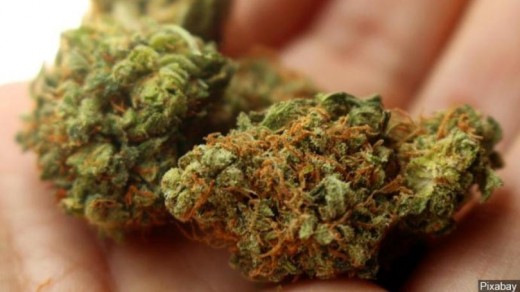Toronto Police: No Weed for Cops Within 28 Days of Working
Recreational Marijuana Use Not The Same As Medical

Should People Who Might Need A Firearm For Work Smoke Marijuana?
A commonly held belief by most of us "working stiffs" is that our off hours are our own. Sure, we might have family obligations that require us to run to all corners of the Earth, but that does not mean we believe we shouldn't have our own time to ourselves. As such, we should also have the right to do, within the letter of the law, as we see fit with that time.
I get that; as a teacher, while I am very appreciative of my downtime with my family and the time I can take to exercise and write, I'm also aware of the very public face I have as an educator. I conduct myself accordingly; sure, I have my moments where I am goofy, but I am what my mom would say a "good kid" and how I am in public reflects that, or at least I hope so.
I often joke that I'm a wee bit squeaky clean, and this is so much true that I haven't once used recreational - or medicinal, for that matter - marijuana. This often results in me being somewhat confused about why people enjoy using marijuana.
Now, the Toronto Police Service has said no police officer shall use marijuana within 28 days of working.
This has no impact on officers who use medical marijuana. Medical marijuana use falls under a separate policy through the Toronto Police Service, according to Toronto Star.
Reportedly, the decision came as a result of much thought and analysis of previous studies done about the effects of marijuana on the body. The 28-day ban is "based on research from the force’s medical advisory service, the Ontario Association of Chiefs of Police, and the Canadian Association of Chiefs of Police about how long THC — the active ingredient in cannabis — can be stored in the body and the varying impact it can have on cognitive abilities, motor functions and decision-making abilities."
I don't deny anyone their right to enjoy any form of social libation in their downtime - it's their downtime, not mine - but by the same token, there have already been a number of studies done that show that THC is stored in the body for a fair length of time. Do we really want someone who's in a line of work where they might be required to use a firearm that still has active THC in their system?
According to Healthline, THC has been detected in a blood test up to 25 days after initial ingestion. The site acknowledges that how long it stays in someone's system does depend on how heavy a user the person is, and says it could be anywhere from 1 to 30 days where THC is detected in someone's system. It reportedly also depends on the sort of drug test being used; with urinalysis in a moderate user (defined as someone who uses marijuana 4 times weekly), THC can stay in someone's system up to 5 to 7 days. With hair, it's far longer, with up to 90 days being the detection window.
It can also be argued that to an extent, each user will feel the effects of marijuana slightly differently, depending on whether or not they are occasional users or chronic users. That being said, given the wide range of time during which THC could be staying in the human body, do we really want to take the chance of someone who is acting in the best interests of public safety possibly having their judgment impaired because of marijuana they used recreationally?
I know what I'm saying is probably not going to be popular - not by a long shot - and I do realize that marijuana does reportedly also have its benefits, particularly for those who suffer from chronic pain and for those who cope on a regular basis with mental health conditions. However, the potential for impaired judgment and slower reaction times is something I don't believe people can afford when it comes to personal and public safety.
The 28-day ban is certainly a significant one, and it's one that will no doubt have significant impact on those who wish to smoke marijuana recreationally and continue to be a part of the Toronto Police Service. However, given we are talking about cops, do we really want to take the chance of them responding to a call when they've potentially still got THC, which can be stored in organs and fatty tissues, affecting them?



